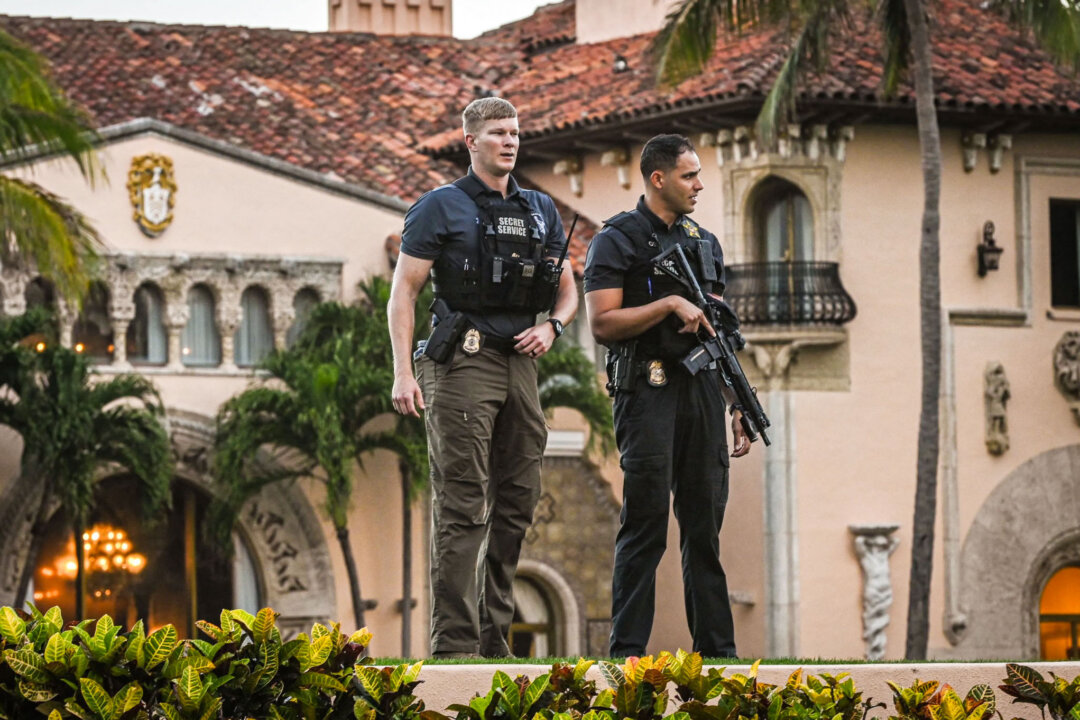Some lawmakers back more funding to hire more agents, but others say manpower allocation is the key.
WASHINGTON, D.C.—In the aftermath of an apparent second attempted assassination of former President Donald Trump, lawmakers are considering making changes to both funding and policy at the Secret Service.
Lawmakers have expressed bipartisan interest in increasing Trump’s security but are divided on the best way to achieve that: Some support additional funding while others want policy changes.
On Sept. 15, a Secret Service agent patrolling Trump International Golf Club at West Palm Beach, Florida, where Trump was playing golf that day, noticed the barrel of a rifle poking through the perimeter fence and immediately opened fire. The weapon’s owner, Ryan Routh, fled but was later apprehended on nearby I-95. He’s currently charged with two felony gun crimes and could face more.
The apparent attempted assassination happened two months after Trump narrowly survived an assassin’s bullet in Butler, Pa. The earlier incident had already led to heightened scrutiny on the Secret Service—scrutiny that’s only grown in the wake of the second suspected attempt.
Previously, acting Secret Service Director Ronald Rowe testified that despite progressive budget increases over the past decade, the agency is currently operating with around 400 fewer agents than it had a decade ago. He cited the stringent hiring process and high private sector demand for agents’ skills as being partially responsible for the shortfall.
Trump himself has mostly expressed gratitude to the Secret Service since the second incident, particularly lauding the agent who first noticed Routh.
President Joe Biden has said the agency “needs more help” and called on Congress to provide additional funding to the agency.
Rowe has said the agency is working with lawmakers to receive additional funding to hire more agents.
Senate Majority Leader Chuck Schumer (D-N.Y.) has said the upper chamber plans to look into additional funding.
“Congress has a responsibility to ensure the Secret Service and all law enforcement have the resources they need to do their jobs. So as we continue the appropriations process, if the Secret Service is in need of more resources, we are prepared in providing it for them, possibly in the upcoming funding agreement,” Schumer said on Sept. 16.
Some members are pushing for policy changes.
Sen. Chris Murphy (D-Conn.) and Sen. Katie Britt (R-Ala.), both members of the Senate Appropriations Committee, queried the Secret Service about its resource needs in a letter to the agency sent after the first assassination attempt.
Murphy told reporters they have a “special focus on what [the Secret Service] would need between now and the inauguration.”
Murphy said additional appropriations might not be needed, saying they could simply allow the Secret Service “to spend at a faster rate between now and the election.”
Sen. Lindsey Graham (R-S.C.) told The Epoch Times he would strongly support new funding, saying agents “are working ungodly schedules.”
“We just need, over the arc of time, more people,” Graham said.
Sens. Gary Peters (D-Mich.), Mazie Hirono (D-Hawaii), and Joni Ernst (R-Iowa) told The Epoch Times they would support new Secret Service funding but are uncertain about how much or by what means.
Specifically, some lawmakers are considering attaching supplemental funding to a hypothetical stopgap funding bill which lawmakers need to pass before Sept. 30 to avert a shutdown.
However, even without additional legislation, such bills are controversial among Republicans, and lawmakers aren’t clear what effect additional funding would have on their ability to pass a stopgap.
House Speaker Mike Johnson (R-La.) said earlier this week that he’s skeptical funding is the best response.
“I think it’s a matter of manpower allocation. We don’t want to just throw more money at a broken system,” Johnson said.
Other proposals put forward in both chambers focus primarily on ensuring that presidential candidates receive the same protection as sitting presidents.
A Senate bill dubbed the “Protect Our Presidents Act” introduced by Sen. Rick Scott (R-Fla.) would do just that. Rep. Mike Lawler’s (R-N.Y.) similar “Enhanced Presidential Security Act” does largely the same.
Several Republicans said they support the ideas behind Lawler’s bill, which is expected to see a House floor vote on Sept. 20.
Both Reps. Tim Burchett (R-Tenn.) and Chip Roy (R-Texas) described the issue as a “cultural problem” at the Secret Service, and rejected additional funding as a long-term solution.
“It’s not that they’re lacking resources. They’ve got a clear operational and cultural problem,” Roy told The Epoch Times, citing increased funding for the agency over the past decade.
Burchett said he would vote for Lawler’s bill but said larger policy changes are needed at the Secret Service.
He specifically referenced the process for granting protection to third-party candidates, citing the difficulties that former independent candidate Robert F. Kennedy Jr. had in receiving Secret Service protection.
The Secret Service did not immediately reply to a request for comment.
Under current law, Secret Service protection must be approved by the secretary of the Department of Homeland Security. Burchett said this process ought to be “[taken] out of political hands” to ensure that all prominent candidates have adequate protection.
Rep. Ralph Norman (R-S.C.) told The Epoch Times he’s also skeptical of simply increasing funding.
“You don’t throw funding until you get to the core of the problem,” Rep. Ralph Norman (R-S.C.) told The Epoch Times. “What’s happened in the last two assassination attempts is unacceptable.”
When asked whether funding or policy was the bigger consideration, Norman said his concern is “competent security.”
“The same protection … the border czar’s getting, Trump ought to get,” Norman said, referencing Vice President Kamala Harris.

